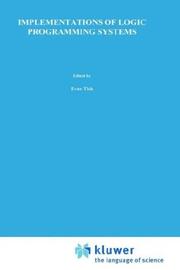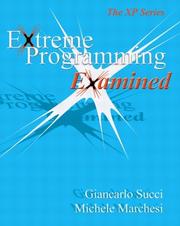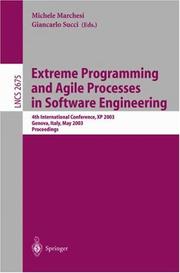| Listing 1 - 10 of 41 | << page >> |
Sort by
|
Book
ISBN: 3642005039 3662441780 Year: 2014 Publisher: Berlin, Heidelberg : Springer Berlin Heidelberg : Imprint: Springer,
Abstract | Keywords | Export | Availability | Bookmark
 Loading...
Loading...Choose an application
- Reference Manager
- EndNote
- RefWorks (Direct export to RefWorks)
This book illustrates how goal-oriented, automated measurement can be used to create Lean organizations and to facilitate the development of Lean software, while also demonstrating the practical implementation of Lean software development by combining tried and trusted tools. In order to be successful, a Lean orientation of software development has to go hand in hand with a company’s overall business strategy. To achieve this, two interrelated aspects require special attention: measurement and experience management. In this book, Janes and Succi provide the necessary knowledge to establish “Lean software company thinking,” while also exploiting the latest approaches to software measurement. A comprehensive, company-wide measurement approach is exactly what companies need in order to align their activities to the demands of their stakeholders, to their business strategy, etc. With the automatic, non-invasive measurement approach proposed in this book, even small and medium-sized enterprises that do not have the resources to introduce heavyweight processes will be able to make their software development processes considerably more Lean. The book is divided into three parts. Part I, “Motivation for Lean Software Development,” explains just what “Lean Production” means, why it can be advantageous to apply Lean concepts to software engineering, and which existing approaches are best suited to achieving this. Part II, “The Pillars of Lean Software Development,” presents the tools needed to achieve Lean software development: Non-invasive Measurement, the Goal Question Metric approach, and the Experience Factory. Finally, Part III, “Lean Software Development in Action,” shows how different tools can be combined to enable Lean Thinking in software development. The book primarily addresses the needs of all those working in the field of software engineering who want to understand how to establish an efficient and effective software development process. This group includes developers, managers, and students pursuing an M.Sc. degree in software engineering.
Computer software --- Software measurement. --- Development --- Management. --- Computer software measurement --- Measurement, Software --- Metrics, Software --- Software engineering metrics --- Software metrics --- Software engineering --- Software engineering. --- Information Systems. --- Project management. --- Management information systems. --- Software Engineering. --- Management of Computing and Information Systems. --- Project Management. --- Software Management. --- Computer-based information systems --- EIS (Information systems) --- Executive information systems --- MIS (Information systems) --- Sociotechnical systems --- Information resources management --- Management --- Industrial project management --- Computer software engineering --- Engineering --- Communication systems --- Computer science. --- Informatics --- Science

ISBN: 0792394577 1461361575 1461526906 Year: 1994 Publisher: Dordrecht Kluwer
Abstract | Keywords | Export | Availability | Bookmark
 Loading...
Loading...Choose an application
- Reference Manager
- EndNote
- RefWorks (Direct export to RefWorks)
Logic programming --- 681.3*I23 --- Computer programming --- Deduction and theorem proving: answer/reason extraction; reasoning; resolution; metatheory; mathematical induction; logic programming (Artificial intelligence) --- Logic programming. --- 681.3*I23 Deduction and theorem proving: answer/reason extraction; reasoning; resolution; metatheory; mathematical induction; logic programming (Artificial intelligence)

ISBN: 0201710404 9780201710403 Year: 2001 Publisher: Boston Addison-Wesley
Abstract | Keywords | Export | Availability | Bookmark
 Loading...
Loading...Choose an application
- Reference Manager
- EndNote
- RefWorks (Direct export to RefWorks)
Computer software --- eXtreme programming --- Development --- 681.3*D2 --- XP (Computer science) --- Computer programming --- Development of computer software --- Software development --- 681.3*D2 Software engineering: protection mechanisms; standards--See also {681.3*K63}; {681.3*K51} --- Software engineering: protection mechanisms; standards--See also {681.3*K63}; {681.3*K51} --- Computer software - Development
Book
ISBN: 3031116585 3031116577 Year: 2023 Publisher: Cham : Springer International Publishing : Imprint: Springer,
Abstract | Keywords | Export | Availability | Bookmark
 Loading...
Loading...Choose an application
- Reference Manager
- EndNote
- RefWorks (Direct export to RefWorks)
This open access book provides information how to choose and collect the appropriate metrics for a software project in an organization. There are several kinds of metrics, based on the analysis of source code and developed for different programming paradigms such as structured programming and object-oriented programming (OOP). This way, the book follows three main objectives: (i) to identify existing and easily-collectible measures, if possible in the early phases of software development, for predicting and modeling both the traditional attributes of software systems and attributes specifically related to their efficient use of resources, and to create new metrics for such purposes; (ii) to describe ways to collect these measures during the entire lifecycle of a system, using minimally-invasive monitoring of design-time processes, and consolidate them into conceptual frameworks able to support model building by using a variety of approaches, including statistics, data mining and computational intelligence; and (iii) to present models and tools to support design time evolution of systems based on design-time measures and to empirically validate them. The book provides researchers and advanced professionals with methods for understanding the full implications of alternative choices and their relative attractiveness in terms of enhancing system resilience. It also explores the simultaneous use of multiple models that reflect different system interpretations or stakeholder perspectives.
Software engineering. --- Software engineering—Management. --- Software Engineering. --- Software Management. --- Computer software engineering --- Engineering
Digital
ISBN: 9783642005039 Year: 2014 Publisher: Berlin, Heidelberg Springer
Abstract | Keywords | Export | Availability | Bookmark
 Loading...
Loading...Choose an application
- Reference Manager
- EndNote
- RefWorks (Direct export to RefWorks)
This book illustrates how goal-oriented, automated measurement can be used to create Lean organizations and to facilitate the development of Lean software, while also demonstrating the practical implementation of Lean software development by combining tried and trusted tools. In order to be successful, a Lean orientation of software development has to go hand in hand with a company’s overall business strategy. To achieve this, two interrelated aspects require special attention: measurement and experience management. In this book, Janes and Succi provide the necessary knowledge to establish “Lean software company thinking,” while also exploiting the latest approaches to software measurement. A comprehensive, company-wide measurement approach is exactly what companies need in order to align their activities to the demands of their stakeholders, to their business strategy, etc. With the automatic, non-invasive measurement approach proposed in this book, even small and medium-sized enterprises that do not have the resources to introduce heavyweight processes will be able to make their software development processes considerably more Lean. The book is divided into three parts. Part I, “Motivation for Lean Software Development,” explains just what “Lean Production” means, why it can be advantageous to apply Lean concepts to software engineering, and which existing approaches are best suited to achieving this. Part II, “The Pillars of Lean Software Development,” presents the tools needed to achieve Lean software development: Non-invasive Measurement, the Goal Question Metric approach, and the Experience Factory. Finally, Part III, “Lean Software Development in Action,” shows how different tools can be combined to enable Lean Thinking in software development. The book primarily addresses the needs of all those working in the field of software engineering who want to understand how to establish an efficient and effective software development process. This group includes developers, managers, and students pursuing an M.Sc. degree in software engineering.
Business management --- Computer science --- Information systems --- Computer. Automation --- computers --- informatiesystemen --- projectmanagement --- software engineering --- informatica management --- computerkunde
Book
ISBN: 3319259628 3319259644 Year: 2016 Publisher: Cham : Springer International Publishing : Imprint: Springer,
Abstract | Keywords | Export | Availability | Bookmark
 Loading...
Loading...Choose an application
- Reference Manager
- EndNote
- RefWorks (Direct export to RefWorks)
In a down-to-the earth manner, the volume lucidly presents how the fundamental concepts, methodology, and algorithms of Computational Intelligence are efficiently exploited in Software Engineering and opens up a novel and promising avenue of a comprehensive analysis and advanced design of software artifacts. It shows how the paradigm and the best practices of Computational Intelligence can be creatively explored to carry out comprehensive software requirement analysis, support design, testing, and maintenance. Software Engineering is an intensive knowledge-based endeavor of inherent human-centric nature, which profoundly relies on acquiring semiformal knowledge and then processing it to produce a running system. The knowledge spans a wide variety of artifacts, from requirements, captured in the interaction with customers, to design practices, testing, and code management strategies, which rely on the knowledge of the running system. This volume consists of contributions written by widely acknowledged experts in the field who reveal how the Software Engineering benefits from the key foundations and synergistically existing technologies of Computational Intelligence being focused on knowledge representation, learning mechanisms, and population-based global optimization strategies. This book can serve as a highly useful reference material for researchers, software engineers and graduate students and senior undergraduate students in Software Engineering and its sub-disciplines, Internet engineering, Computational Intelligence, management, operations research, and knowledge-based systems.
Computer Science --- Engineering & Applied Sciences --- Engineering. --- Software engineering. --- Artificial intelligence. --- Computational intelligence. --- Computational Intelligence. --- Artificial Intelligence (incl. Robotics). --- Software Engineering. --- Intelligence, Computational --- Artificial intelligence --- Soft computing --- AI (Artificial intelligence) --- Artificial thinking --- Electronic brains --- Intellectronics --- Intelligence, Artificial --- Intelligent machines --- Machine intelligence --- Thinking, Artificial --- Bionics --- Cognitive science --- Digital computer simulation --- Electronic data processing --- Logic machines --- Machine theory --- Self-organizing systems --- Simulation methods --- Fifth generation computers --- Neural computers --- Computer software engineering --- Engineering --- Construction --- Industrial arts --- Technology --- Artificial Intelligence.

ISBN: 3540402152 9783540402152 3540448705 Year: 2003 Publisher: Berlin, Heidelberg : Springer Berlin Heidelberg : Imprint: Springer,
Abstract | Keywords | Export | Availability | Bookmark
 Loading...
Loading...Choose an application
- Reference Manager
- EndNote
- RefWorks (Direct export to RefWorks)
This book contains most of the papers presented at the 4th International C- ference on Extreme Programming and Agile Processes in Software Engineering (XP 2003), held in Genoa, Italy, May 2003. The XP 200n series of conferences were started in 2000 to promote the - change of new ideas, research and applications in the emerging ?eld of agile methodologies for software development. Over the years, the conference has - come the main world forum for all major advances in this important ?eld. Also this year the contributions to Agile Methodologies and Extreme P- gramming were substantial. They demonstrate that the topic is continuing to gain more and more momentum. In spite of some criticism of agile meth- ologies, everyone agrees that they address some unresolved needs of software practitioners. People still do not know how to develop software on time, with the desired features, and within the given budget! This volume is divided into several thematic sections, easing reader’s na- gation through the content. Full papers are presented ?rst, followed by research reports, papers from the Educational Symposium, and papers from the Ph.D. Symposium. The presentations given during three panel sessions held at the conference conclude the book. The section on Managing Agile Processes includes contributions highlighting the sometimes di?cult relationship between agile methodologies and mana- ment, and includes approaches and suggestions that should facilitate the acc- tance of agile methodologies at the di?erent levels of management.
Computer software --- eXtreme programming. --- XP (Computer science) --- Computer programming --- Development of computer software --- Software development --- Development. --- Agile software development --- eXtreme programming --- Agile development (Computer science) --- Agile methods (Computer science) --- Agile processes (Computer science) --- Computer science. --- Computer programming. --- Software engineering. --- Programming languages (Electronic computers). --- Management information systems. --- Computer Science. --- Software Engineering. --- Programming Techniques. --- Programming Languages, Compilers, Interpreters. --- Management of Computing and Information Systems. --- Computer-based information systems --- EIS (Information systems) --- Executive information systems --- MIS (Information systems) --- Sociotechnical systems --- Information resources management --- Management --- Computer languages --- Computer program languages --- Computer programming languages --- Machine language --- Electronic data processing --- Languages, Artificial --- Computer software engineering --- Engineering --- Computers --- Electronic computer programming --- Electronic digital computers --- Programming (Electronic computers) --- Coding theory --- Informatics --- Science --- Communication systems --- Programming --- Development --- Information Systems.
Book
ISBN: 3030985997 3030985989 Year: 2022 Publisher: Cham Springer Nature
Abstract | Keywords | Export | Availability | Bookmark
 Loading...
Loading...Choose an application
- Reference Manager
- EndNote
- RefWorks (Direct export to RefWorks)
This open access book describes the development of Innopolis, a young Russian university established in 2012 to focus on teaching excellence in computer science, engineering, and robotics. It reports on the problems that were faced in the first decade of its development, and the adopted solutions. It shows how the key aspects for the development of the faculty, the curricula, the university structure, and the challenge of internationalization have been successfully addressed by the university management and professors, and how the solutions are scalable for other newly founded research organizations.
Universities and colleges --- History. --- Innopolis University --- Colleges --- Degree-granting institutions --- Higher education institutions --- Higher education providers --- Institutions of higher education --- Postsecondary institutions --- Public institutions --- Schools --- Education, Higher --- Computer Education --- University Development --- Development of an International Faculty --- Curricula Development --- Industry Cooperation --- Online Education
Book
ISBN: 303093134X 3030931358 Year: 2021 Publisher: Cham, Switzerland : Springer,
Abstract | Keywords | Export | Availability | Bookmark
 Loading...
Loading...Choose an application
- Reference Manager
- EndNote
- RefWorks (Direct export to RefWorks)
Digital
ISBN: 9783540350958 Year: 2006 Publisher: Berlin Heidelberg Springer-Verlag GmbH
Abstract | Keywords | Export | Availability | Bookmark
 Loading...
Loading...Choose an application
- Reference Manager
- EndNote
- RefWorks (Direct export to RefWorks)
Computer science --- Programming --- Computer. Automation --- Agile --- informatica --- maatschappij --- programmeren (informatica) --- programmeertalen --- software engineering --- informatica management
| Listing 1 - 10 of 41 | << page >> |
Sort by
|

 Search
Search Feedback
Feedback About UniCat
About UniCat  Help
Help News
News